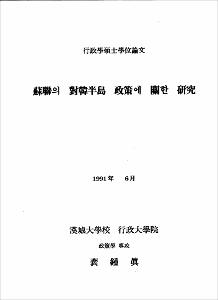蘇聯의 對韓半島 政策에 關한 硏究
- Files in This Item:
-
-
Download
 000000066298.pdf
기타 데이터 / 1.8 MB / Adobe PDF
000000066298.pdf
기타 데이터 / 1.8 MB / Adobe PDF
-
Items in Repository are protected by copyright, with all rights reserved, unless otherwise indicated.
 000000066298.pdf
기타 데이터 / 1.8 MB / Adobe PDF
000000066298.pdf
기타 데이터 / 1.8 MB / Adobe PDFItems in Repository are protected by copyright, with all rights reserved, unless otherwise indicated.